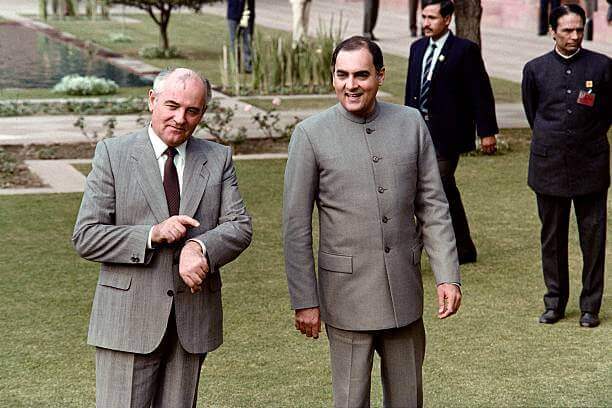Following the death of former Soviet Union President Mikhail Gorbachev on Tuesday, Indian Prime Minister (PM) Narendra Modi paid tribute to “one of the leading statesmen of the 20th century,” saying he left an “indelible mark on the course of history” and hailing his “contribution to [the] strengthening” of bilateral relations.
Gorbachev, who passed away in Moscow at the age of 91 after a “prolonged illness,” was largely responsible for setting the ground for a strong India-Russia relationship during his six-year tenure.
I extend our deepest condolences to the family and friends of H.E. Mr. Mikhail Gorbachev, one of the leading statesmen of the 20th century who left an indelible mark on the course of history. We recall and value his contribution to strengthening of relations with India.
— Narendra Modi (@narendramodi) September 1, 2022
Soon after becoming president in 1985, India was the first Asian country Gorbachev visited in 1986. During the historic visit to New Delhi, he travelled with 110 ministers, including then Deputy PM Vladimir Kamentsev, Foreign Minister Eduard Shevardnadze, head of the Soviet Communist Party’s foreign affairs department Anatoliy Dobrynin, and Chief of General Staff Marshal Sergei Akhromeyev. Furthermore, 500 security personnel accompanied the Russian leader, along with seven planes loaded with food, communication and security equipment, and 31 cars.
Then-Indian PM Rajiv Gandhi welcomed him with “spangled elephants and red-coated soldiers mounted on camels,” which was touted to be one of the most lavish welcomes accorded to a foreign dignitary till then. The Indian capital’s streets were lined with their posters and thousands gathered along the roads from the airport to the Rashtrapati Bhavan.
#India was the first Asian country Mikhail #Gorbachev visited (November 1986) after becoming the General Secretary of the Communist party of the USSR in 1985. He was deeply touched by warm welcome of the Indian people describing it as the kind of reception he hadn't had anywhere. https://t.co/jracr01rs8 pic.twitter.com/NKBHxT3tVO
— Russia in India 🇷🇺 (@RusEmbIndia) August 31, 2022
In a joint press conference, Gandhi expressed his “delight” at Gorbachev’s visit and called him a “crusader for peace.” “When friends come calling, our hearts light up,” he remarked. In response, Gorbachev vowed to “not take a single step in our foreign policy that could damage India’s real interests.” It was during this tour that the famous Delhi Declaration was signed, which “called for the complete destruction of nuclear arsenals before the end of the century, and asserted the importance of solving problems in a non-violent way.”
The two leaders talked about cooperation in space, infrastructure development, and defence, and supplying India with advanced military equipment, such as the Russian fighter jet MiG-29, which New Delhi received a few months later. Gorbachev also agreed to supply T-72 tanks to India. In fact, India was also the first developing country to lease nuclear submarines from Soviet Russia during his presidency.
My generation knew Communism was dead when we saw Gorbachev in a Pizza Hut commercial. Last few decades must have been awfully lonely and strange for Gorbachev. https://t.co/ax3v90sQxB
— Sunanda Vashisht (@sunandavashisht) August 30, 2022
Gandhi, for his part, condemned the Western policy of militarising outer space through the Strategic Defence Initiative (SDI), which was a space-based anti-missile system put forth by then-United States (US) President Ronald Reagan. Both Gandhi and Gorbachev called for complete disarmament.
The visit was particularly important in the face of growing ties between the United States (US) and Pakistan, and also amid the security threat from China. Though Gorbachev did not condemn Pakistan, he advocated for talks between Moscow and Islamabad to ease tensions.
India lost friend in Mikhail Gorbachev. The last President of USSR, was most influential world leader when I entered the college in early 90s. He was architect of “Glasnost and Perestroika”. He brought about the end of the Cold War and paved the way for democracy. #RIPGorbachev pic.twitter.com/3fn7Bv1sa8
— Dr.Dinesh Dasa (@dineshdasa1) August 31, 2022
Gandhi also visited Moscow five times during the first three years of his office. During his 1987 visit, Gorbachev dedicated a monument and named a square in Moscow to honour Gandhi’s mother and former PM Indira Gandhi.
Though the two appeared to have developed a “close friendship,” Gandhi did not refrain from opposing Gorbachev’s all-Asia forum, calling it “an old concept” and asserting that India was against “countries... interfering, intervening in areas outside their own.”
1986 में गोर्वाचौव जब भारत दौरे पर आए थे… pic.twitter.com/A467o9Z6e0
— Umashankar Singh उमाशंकर सिंह (@umashankarsingh) August 31, 2022
To review progress on the Delhi Declaration, Gorbachev visited India in 1988 for three days and consolidated ties in trade, economy, science, technology, and culture, and signed several inter-governmental agreements like the construction of a nuclear power plant in India and cooperation in the exploration and peaceful use of space. Gorbachev was also honoured with the Indira Gandhi Prize for Peace, Disarmament, and Development during the visit.
In 1988, many critics felt that Moscow was abandoning developing nations in lieu of building a better relationship with the US, though Gorbachev called such allegations “totally groundless.” However, following the break-up of the Soviet Union, India recalibrated its ties in favour of the West.
I remember when Gorbachev visited India in 1986, our school hosted a painting competition on the theme of Indo-Soviet friendship. The 1st prize went to a boy who drew the Soviet leader's portrait with the port-wine stain on his forehead resembling the map of India!#RIPGorbachev https://t.co/PH2tUtLBOB pic.twitter.com/JuQtGT3Ird
— Abhishek G. Bhaya अभिषेक অভিষেক ابھیشک 加冕礼 (@abhishekbhaya) September 1, 2022
The strong ties developed between the two countries during the Gorbachev era have played a role in India’s reluctance to vote against Russia in the United Nations as well as its decision to purchase Russian defence equipment and discounted oil despite significant pressure from Western nations, particularly the US.

